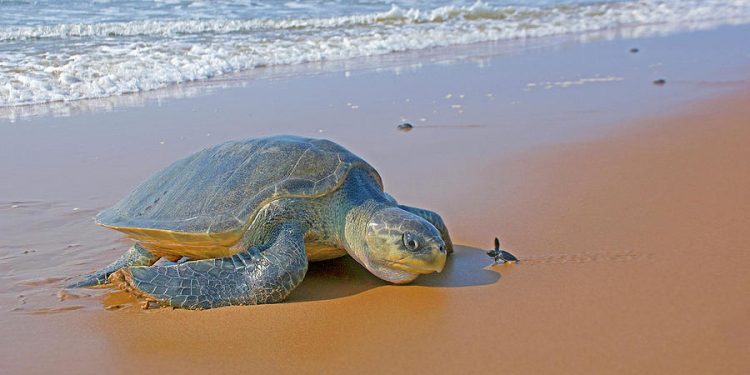Like every year, the state government has imposed a seven-month ban, effective from November 1, on fishing within 20 km of the river mouths of Dhamra, Devi and Rushikulya for protection of the nests of the endangered olive ridley sea turtles. However, it has been observed that despite the ban, fishing trawlers are seen on large parts of the coast, thanks to ineffective monitoring mechanism. Orissa POST analyses the effectiveness of the ban and its loopholes…
Bhubaneswar: The state government has imposed ban on sea fishing under the provisions of the Odisha Marine Fishing Regulation Act (OMFRA), 1982 and Wildlife Protection Act, 1972. As per the ban order, use of motor boats, trawlers and mechanised fishing boats have been prohibited along the stretch of Dhamra-Devi-Rushikulya river mouths to save the endangered olive ridley turtles, said a forest official.
The olive ridley sea turtles reach Gahirmatha beach in Kendrapara district, Devi river mouth in Puri district, and Rushikulya river mouth in Ganjam district to lay eggs during winter every year. They lay eggs in March after mating and the hatchlings come out by May.
However, whether the ban has any impact on safeguarding the endangered species is a question of million dollars.
According to Somya Ranjan Biswal, an environmentalist and olive ridley conservationist, who had organised several rallies with olive ridley costume, said, “Despite the ban order, we see several fishing boats and trawlers operating in many nesting areas of the state. This not only proves the futility of the ban but also a failure of coastal security. The state government, which had made ‘Olly’ as its official mascot for Odisha Men’s Hockey World Cup, should step up measures to seize the illegal trawlers and save the ridleys.”
Raising concern over the death of turtles, Soumya Ranjan said, “In January this year, the carcasses of around 600 olive ridley turtles and two dolphins were recovered by forest officials along the stretch from Hukitola to Eakakula in Gahirmatha Marine Sanctuary area.”
He also said that the coastal volunteers who have been entrusted with the task of collecting the eggs of olive ridley turtles for their conservation are not well-trained. The government must focus on conserving the endangered species, he added. He apprehended that the international coastal festival- Marine Drive Eco Retreat- to be organised by the state government near Konark from December 14 might affect the mating process of olive ridley turtles.
Meanwhile, since the ban affects the livelihood of fishermen in the coastal areas of the state, the government has been providing financial assistance during the period. However, it has been alleged that the aid has been insufficient and many fishermen are also deprived of it.
Sources said 20,000 fishermen are going to be affected by the ban in coastal Kendrapara as they have already been asked by the boat owners not to come to work during the ban period.
Bichitrananda Biswal, winner of Biju Patnaik Award for Wildlife Conservation and an olive ridley conservationist, said, “Had the state government implemented the decision of a high-powered state committee to compensate the fishermen or provided alternative livelihood to them, this problem could have been avoided.” Though the state government has been providing a financial assistance of Rs 7,500 each to the marine fishermen, many fishermen are deprived of the same. Also, there has been a demand to increase the compensation amount to Rs 10,000.
Olive ridleys are friends of fishermen, said Biswal, adding that the turtles eat jelly fish, which eat other fishes.
He also said that the government must use the funds under Integrated Coastal Zone Management (ICZM) towards fishermen’s welfare. “If the government provides alternative livelihood to fishermen effectively during the ban, they can help in saving the olive ridley turtles. Otherwise, the ridleys will be added to the list of extinct species.
“The conservation of the endangered turtle species is no doubt important but should it be done at the cost of thousands of fishermen who pose no threat to them,” said Narayan Haldar, president of ‘Odisha Maschyajibi Sangha’.
According to Manas Ranjan Sahu, assistant director of Fishery (Marine) (ADF), Kujanga, “The state government has been providing a financial assistance of Rs 7,500 to around 2,000 marine fisher folk, including the registered boat owners and its crew members under livelihood support during fishing ban. But several fishermen have been left out. The department has brought to the notice of the state government to add the left-out fishermen.”
Principal Chief Conservator of Forests, Wildlife, Hari Shankar Upadhyay said, “We are looking into the situation and will hold a meeting with the fishermen and others November 16.”






































